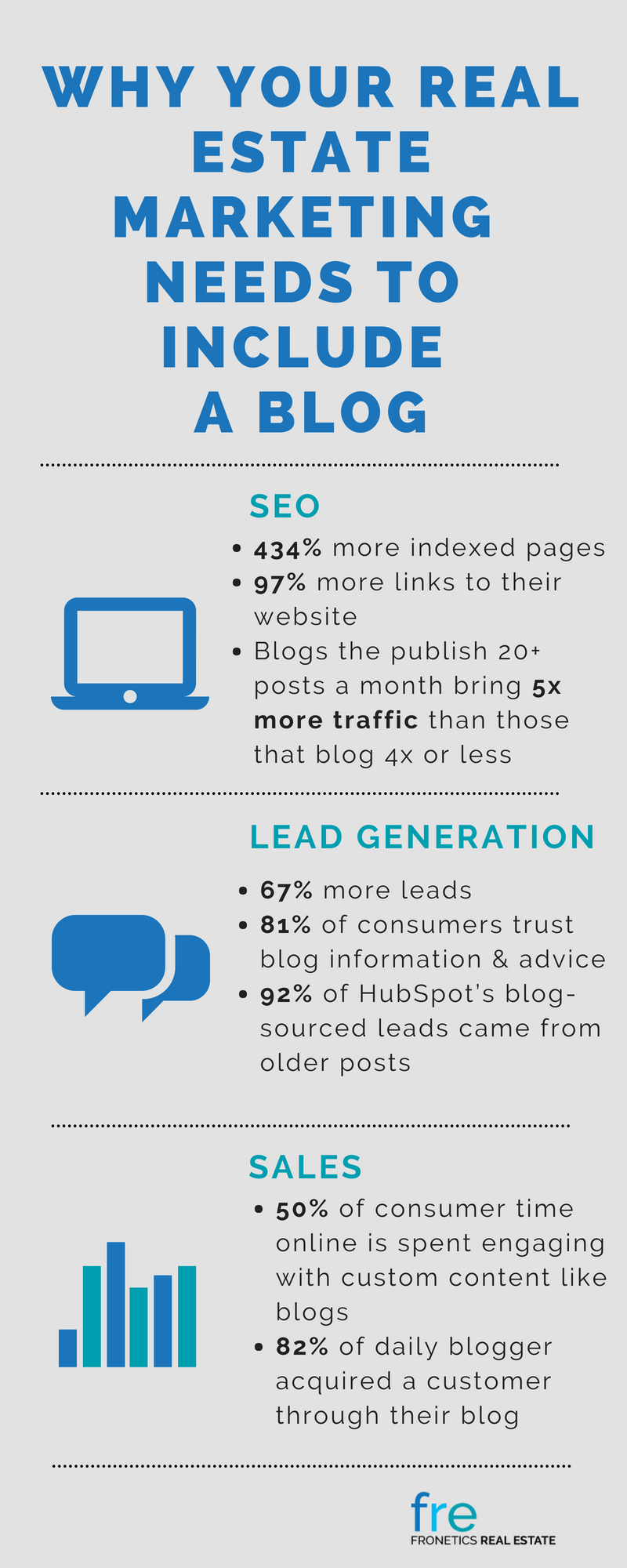Posts Tagged "lead generation"

Real Estate Marketing Strategy 2019: Retargeting
Retargeting offers a number of advantages to real estate marketers, including increased lead generation and conversions.
Highlights:
- A retargeted ad, rather than going out to a general population with certain parameters (a specific search term, for example), is limited to those who have already visited your website.
- Customers need repeat visits or contacts with your brand to determine if they want to purchase or lease one of your properties.
- Retargeting makes it easier for you to connect with potential clients and get the results you need to grow your business.
As you set your real estate marketing strategy for 2019, you want to be sure that you aren’t missing out on any vital opportunities to reach potential customers. You’ve probably designed plans for your social media accounts, put together an email marketing list, and worked to improve your SEO — but have you considered retargeting as part of your real estate marketing strategy for 2019?
What is retargeting?
Retargeting allows you to focus your attention on people who have already visited your website. A retargeted ad, rather than going out to a general population with certain parameters (a specific search term, for example), is limited to those who have already visited your website. This allows you to generate more repeat traffic, which can, in turn, help with your conversion rates and, ultimately, your sales.
In order to set up ad retargeting, you start by inserting a specific piece of code into your website. Google ads have easy to follow tutorials on how to set up codes that link to your ads. The code has no impact on the way your site runs and, for the most part, it’s unnoticeable to potential clients. When they visit your website, however, the code attaches a cookie to the visitor. Then, when the visitor leaves your site and sees ads elsewhere on the internet, the cookie lets the ad provider know they’ve been to your site — and increases the likelihood the visitor will see one of your ads.
How does retargeting help?
As a real estate marketer, you may make contact with your clients in a variety of ways: via email, over the phone, in person, on social media, and through your website. When potential buyers visit your website, they only have about a 2% chance of converting, whether that means signing up for your email list or calling you about putting their house on the market.
The more they spot your brand, the more likely they are to remember your name and company, which increases the chance they will turn to you when they are ready to make a purchase. Customers need repeat visits or contacts with your brand to determine if they want to purchase or lease one of your properties. Retargeted ads ups the chances of a conversion by as much as 70%.
Is retargeting part of your strategy?
So, how do you actually incorporate retargeting into your real estate marketing strategy?
Adding retargeting to your paid search ads will increase the odds you will reach potential clients who have visited your site in the past, which raises the odds they are genuinely looking for a property in your area. Retargeting is also a highly effective way to connect with past clients when they have future property needs.
The simple strategy of remarketing can offer a number of advantages that will make it easier for you to connect with potential clients and get the results you need to grow your business.
Related posts:
- Our 6 Favorite Marketing Automation Tools for Real Estate Marketers
- What are Google Sitelinks and Why Real Estate Marketers Need to Know About Them
- Paid Digital Advertising: A Beginner’s Guide for Real Estate Marketers
Posts Tagged "lead generation"

Real Estate Marketing Leads: 4 Myths (and How to Disprove Them)
Don’t let these four myths get in the way of creating an effective strategy for capturing real estate leads.
Highlights:
- As you start to develop your lead-capture strategy, don’t let certain myths and misunderstandings derail your efforts.
- If you confine yourself to one or even two methods of finding leads, you’re unnecessarily limiting your potential.
- The better you understand your prospects, the more you’ll be able to meet their needs and turn them into customers.
One of the most pressing challenges for all real estate professionals is to get a steady supply of real estate leads. But as you start to develop your lead-capture strategy, don’t let certain myths and misunderstandings derail your efforts.
Let’s look at four of the top myths when it comes to real estate leads.
Myth #1: Real estate leads that don’t buy immediately are worthless
It can be tempting to fall into black-and-white thinking when it comes to leads. When prospects don’t show an immediate interest in making a purchase, you might dismiss them as dead leads. That’s a mistake in any field, but especially in the realm of real estate. The only leads that are truly dead or worthless are ones where you have no accurate contact information, or they have specifically told you not to contact them again.
Just because a lead doesn’t require your services right now doesn’t mean he or she never will. Real estate purchasing is closely tied to people’s circumstances, which can change over time. That’s why it makes sense to look at every promising lead as a long-term prospect with whom you should periodically follow up.
Myth #2: There’s only one way to find leads
Real estate marketers have a wide selection of lead generating strategies to choose from. These include:
- Advertising (online and offline)
- Social media
- Billboards
- Blogging: A real estate blog is a powerful way to build your credibility as well as SEO.
- Direct mail
You may develop certain preferences for finding leads. However, if you confine yourself to one or even two methods, you’re unnecessarily limiting your potential. An omnichannel lead generating strategy is your best approach.
It’s good to combine high-tech and old-school methods, for example. You certainly need to take advantage of digital marketing, which includes an up-to-date website and social media presence. At the same time, offline strategies are still effective as well. The more ways you have to engage with prospects, the more qualified leads you’ll attract.
Myth #3: It’s more important to acquire leads than to nurture them
Lead generation is only the first step in the real estate marketing process. If you’re too caught up in the lead generation process, you may only make a brief effort with each lead before putting it aside and looking at the next one. Instead, you need to think in terms of lead management and nurturing. This includes:
- Segmenting leads so you know what type of offers to put in front of each prospect. This is fairly easy to do with web leads. You can, for example, set up separate SEO, social media, and email marketing campaigns based on different keywords and topics.
- Learning the best ways to contact each lead. Some people prefer to be contacted by phone, email, or social media, for example.
- Following up regularly. You don’t want to bombard prospects with messages. However, you do want to be proactive and reach out to leads every so often.
Lead nurturing and management really come down to building relationships with prospects.
Myth #4: Once you’ve closed, you can neglect the lead
Closing a sale is always exhilarating. You shouldn’t, however, think of a successful closing as the end of the process. Think of it, rather, as the start of a long-term, mutually beneficial relationship. It’s important to show clients that you care about them, even after the sale.
- Ask clients to complete a survey. This provides insight into areas where you can improve.
- Send holiday and birthday greetings.
- Send occasional emails or make calls asking if there’s anything you can do for them.
- Request referrals. Your past clients are often one of your best sources for finding future clients.
Avoid These Myths
Make sure you recognize these myths for real estate leads so you don’t fall prey to them. It’s important to remember that each lead is a unique individual with specific characteristics and preferences. Many mistakes occur when business owners and investors generalize too much about their leads. The better you understand your prospects, the more you’ll be able to meet their needs and turn them into customers.
Related posts:
- How Inbound Marketing for Real Estate Works to Improve Sales
- How to Explain Content Marketing ROI to Win (or Keep) Buy-In
- 6 Signs It’s Time to Consider Outsourcing Your Real Estate Marketing
Posts Tagged "lead generation"

How to Increase Leads with Chatbots
Real estate brands are all too familiar with the challenges of generating leads. Here’s how chatbots can help by improving user experience and engagement.
Highlights:
- Within one day of adding a chatbot to our website, we had a meeting set up with a prospect. That was in the first 24 hours.
- Using a chatbot for your properties means that your real estate brand is working even when you aren’t.
- Conversational chatbots help build trust in your real estate brand while creating a positive customer experience.
We have talked a lot about the popularity of chatbots and how to implement them into your digital marketing strategy. But beyond the initial set up, have you really squeezed the juice out of this automated tool to help increase leads?
We decided to dive into the chatbot pool and our firm’s results speak for themselves. Within one day of adding a chatbot to our website, we had a meeting set up with a prospect. That was in the first 24 hours. This prospect turned out to be our next client and the initial connection was all made through the chatbot.
Lead generation with conversation
Buying or leasing a property is a huge decision, one which usually involves a range of emotions. One of the best ways to connect with potential buyers is through a thoughtful and informative customer experience.
Chatbots can help bridge the gap between your brand and potential buyers. Conversational chatbots help build trust in your real estate brand while creating a positive customer experience. They typically handle conversations with clients that are at the top of the funnel — generally people you don’t know and who might be unsure of whether they are actually going to buy/sell the property.
An article in The Startup on chatbots for real estate concludes they bring many benefits:
“The bot can be programmed on tasks like collecting basic information in the form of asking relevant questions and generating relevant answers resulting in an e-mail capture. Additionally, the chatbot can even transfer the conversation to a human agent, if need be.”
Other lead generating opportunities with chatbots
Real time answers 24/7
Questions about your new property or specific amenities? These are questions that chatbots can immediately answer. Don’t leave prospects waiting for you to return their email or form submission. Bots can answer questions about your property instantly.
The other benefit of using chatbots? They don’t need sleep! Real estate questions don’t always arrive at convenient times. Using a chatbot for your properties means that your real estate brand is working even when you aren’t. Prospects can get their questions answered 24 hours a day, seven days a week.
Virtual tours
Nurture prospects with catchy images of your property and amenities. With the click of a button, your chatbot can offer prospects a virtual tour of your property without ever leaving the page. The impact: prospects leave the chat armed with informative and helpful information about your real estate brand.
Tracking
Most chatbots automatically log interactions with leads that engage with your bot. Once you’re ready to engage with prospects, you can easily access past interactions to know where the prospect is in the sales funnel, as well as key preferences they may have expressed in earlier conversations.
Follow up
Real estate brands are constantly juggling marketing tasks. Use chatbots to help alleviate your workload with follow–up automation. Users can identify how they want to be contacted or specific questions they need answered, taking the guess work out of the follow up process.
Real estate brands need to experiment with chatbots for the ease and convenience of automation, along with the positive audience experience. But to get the most out of your chatbot make sure you’re tracking your success and tweaking interactions along the way.
Need help setting up your chatbot? We’re here to help.
Related posts:
- Using Messaging Platforms for Real Estate to Deliver Content
- Good Real Estate Marketing Gets Personal
- Social Media Trends for 2018 Real Estate Marketers Need to Know
Posts Tagged "lead generation"

Infographic: Statistics that Prove Why Your Real Estate Marketing Needs to Include a Blog
If you’re a real estate marketer who’s not blogging, you’re missing out.
Everyone knows you need a property website to succeed in this industry. But when it comes to making that website competitive, many abandon the brightest idea that would help them in doing so — namely, blogging.
Real estate blogging does its bit for lead generation, SEO, and sales. So if you think your property can thrive without it, you might want to think again.
Search engine visibility
As search engine algorithms get increasingly complex and sophisticated, the quality of your website’s content becomes more and more important. It’s your content that informs search engines about your site (not just keywords anymore), improving your rank in relevant search queries. And the stats bear it out — according to HubSpot, companies that blog receive 434% more indexed pages on average and 97% more links to their website.
Another fact to consider: according to a recent study by Search Metrics, the average word count of the highest ranking content in Google is between 1,140-1,285 words. In other words, long-form content, like blog posts, is one of the best things you can do to improve your website’s SEO.
But don’t be fooled into thinking that quantity outranks quality. Simply pumping out a high word count isn’t enough. Your content needs to be well-written, thoroughly researched, and engaging.
Lead generation
Blog content is ideal to share (and link to) in email or social media marketing campaigns. It can help undecided leads learn about your properties and sway them in a positive direction. Sharing your blog posts on your social media accounts helps give validity and authority to your company, as you disseminate content you created yourself.
A recent study from the Content Marketing Institute found that 67% more leads are generated by companies with an active blog. Not only that, 81% of U.S. online consumers trust information and advice from blogs. So your blog is your best bet in terms of becoming a trusted resource for your audience — leading directly to more effective lead generation and nurturing.
Sales and relationships
61% of buyers report feeling better about a company that delivers custom content and are therefore more likely to buy from that company. And furthermore, HubSpot reports that 50% of consumer time online is spent engaging with custom content — like blogs. And perhaps most powerfully, 82% of marketers who blog daily acquired a customer using their blog, as opposed to 57% of marketers who blog monthly. Blogging helps you sell real estate, and it helps you build lasting and fruitful relationships with your audience.
Check out our infographic for statistics on why your real estate marketing strategy should include blogging.
Infographic: Why your real estate marketing should include a blog
Related posts:
- 4 Ways a Blog Can Help You Sell Real Estate
- Drive More Traffic and Generate More Leads with Your Real Estate Blog with our Editorial Calendar Template
- Fronetics Real Estate Blog Named Top 60 Real Estate Marketing Blog
Posts Tagged "lead generation"

Content Marketing vs. Sales Staff: Who Does What?
When your content marketing and sales forces align their efforts, they form a powerful symbiotic relationship that grows your brand and your bottom line.
There’s a big misperception out there that content marketing represents some kind of threat to the job security of sales personnel.
It’s absolutely true that content marketing is an inbound approach, contrary to the traditional outbound approach of a real estate sales force. But make no mistake: Content marketing is not a substitute or replacement for an expert sales staff.
In fact, it’s when marketing and sales work in tandem that they’re most effective. They can help each other out to generate more leads, nurture current leads more effectively, and even help close more deals.
Content marketing helps generate a steady flow of quality leads, and it provides targeted information to usher prospects down the sales funnel. But even quality leads don’t turn into sales on their own. This is where a sales staff comes in — to take those leads and cultivate them into new business.
Content marketing vs. sales: Division of labor
For content marketing and sales to work seamlessly together, it’s important to have a clear idea of the role of each. They provide different touch points for leads at each stage of the buying cycle. Here’s a quick primer:
1. Forming a relationship
In this early stage of the cycle, your content marketing efforts go toward opening up a dialogue with potential buyers and renters. Often, potential leads’ first engagement with your property comes when they come across one of your blog posts while searching the web or see one of your social media posts because they’re connected to one of your followers.
This is when your sales staff picks up the ball, keeping that positive contact going by developing it into a conversation. It’s your sales team’s job to cultivate an ongoing personal relationship with leads that come in because they encountered your content.
2. Providing information
Now that you’ve established a relationship and your sales team is continuing a dialogue with your prospect, content marketing can step in. Potential buyers spend more time than ever researching properties, considering content such as blog posts, neighborhood guides, and social media posts before making a purchase decision. The content that you share with prospects at this stage of the buyer’s journey should be designed to answer informed questions and tip the scales in your favor.
At this stage, your sales staff should be directly answering questions from prospects. When a lead reaches out with a query, it’s likely that he or she has done a fair amount of research. So your sales reps need to speak specifically to the customer’s needs in a way that content alone can’t do to keep them interested and moving down the funnel.
3. Advocating for your brand
Content marketing increases brand awareness for your properties. It helps elevate your brand position within the real estate industry and keeps your property in their sightlines, even at a time when potential buyers aren’t ready to make a purchase.
When a prospect is preparing to make a purchase or to rent property, your sales staff is the primary advocate for your brand and properties. They should be proactive in pursuing business when leads show interest in your content or when they reach out with questions. They drive dialogue and get to know potential buyers and how your property can suit their needs.
A match made in heaven
When content marketing and sales work together, you’ll see the results hit your bottom line. Curating and creating great content will generate quality leads for your company and can empower your sales force to build relationships with potential buyers and renters — and to close the deal.
Related posts:




